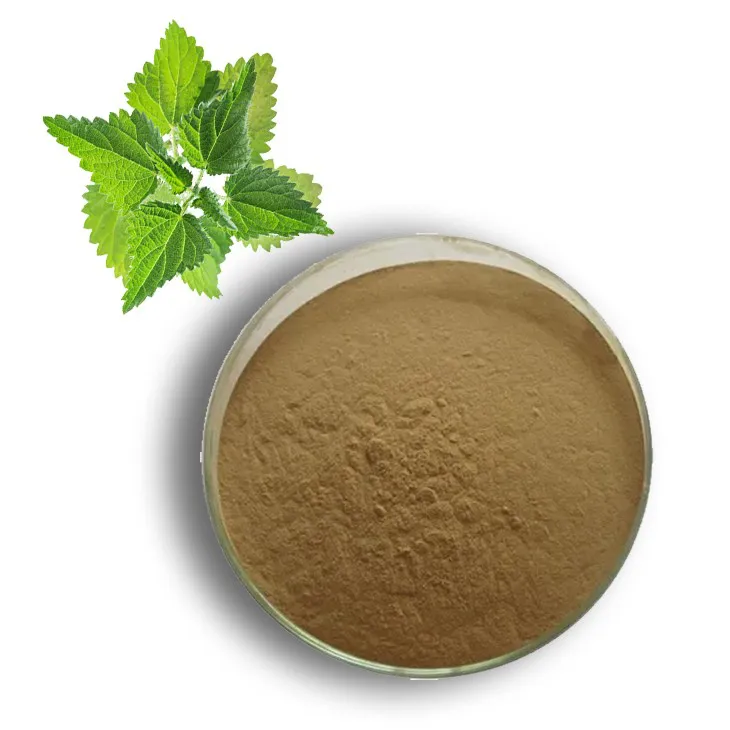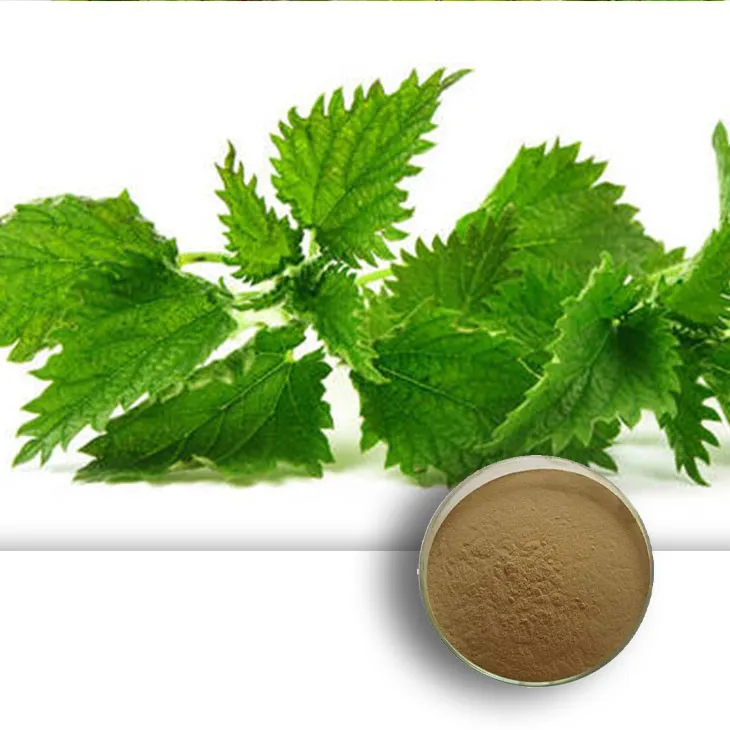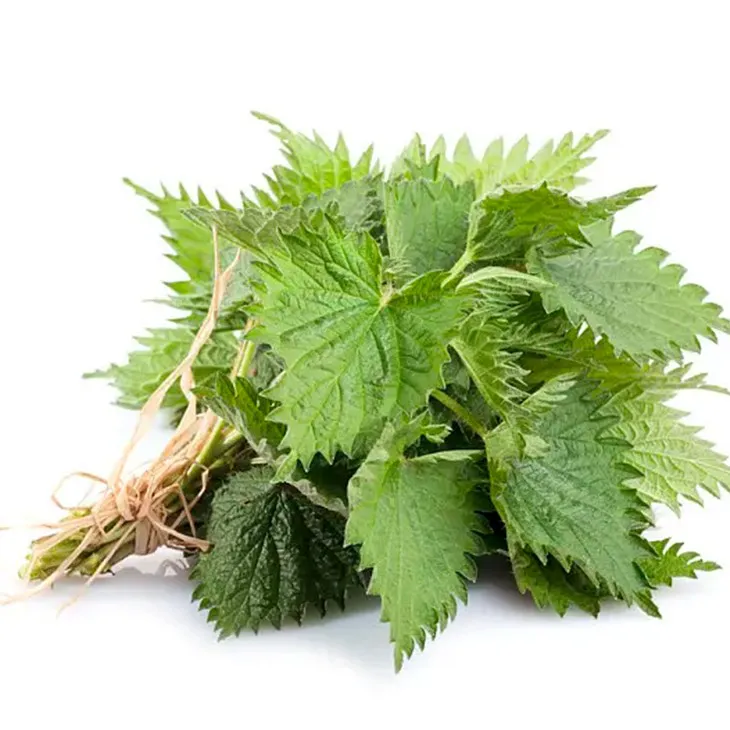- 0086-571-85302990
- sales@greenskybio.com
Nettle leaf extract: components of fertilizer and feed.
2024-11-28

1. Introduction
The Nettle leaf extract has emerged as a highly promising substance with significant potential in the fields of agriculture and livestock production. It is being increasingly recognized for its dual - role capabilities as both a fertilizer component and a feed ingredient. This multi - functional nature of Nettle leaf extract makes it a subject of great interest among researchers, farmers, and animal husbandry practitioners alike.

2. Nettle leaf extract as a Fertilizer Component
2.1 Nutrient - Rich Profile
The nettle leaf extract is a veritable treasure trove of nutrients. It contains a wide array of macronutrients such as nitrogen, phosphorus, and potassium. These are essential for plant growth as they play crucial roles at different growth stages. For example, nitrogen is vital for the production of chlorophyll, which is necessary for photosynthesis. Phosphorus is involved in energy transfer within the plant cells, while potassium helps in regulating water movement and maintaining turgor pressure.
In addition to macronutrients, the extract also contains micronutrients like iron, zinc, manganese, and copper. These micronutrients, although required in smaller quantities, are no less important. They are involved in various enzymatic reactions within the plant. For instance, iron is a key component of many enzymes involved in respiration and photosynthesis.
2.2 Soil - Improving Properties
One of the most significant advantages of using nettle leaf extract as a fertilizer is its positive impact on soil health. The organic matter present in the extract has a profound effect on soil structure. It helps to bind soil particles together, creating aggregates. This improves soil porosity, allowing for better air circulation and water infiltration. As a result, plant roots can access oxygen more easily, which is essential for their respiration.
The extract also enhances the soil's water - holding capacity. This is particularly beneficial in areas with erratic rainfall patterns or in arid regions. By increasing the water - holding capacity of the soil, the nettle leaf extract helps to ensure that plants have a continuous supply of water, reducing the risk of drought stress.
Furthermore, the use of nettle leaf extract can stimulate microbial activity in the soil. Microbes play a vital role in nutrient cycling. They break down organic matter, releasing nutrients in forms that can be readily absorbed by plants. By promoting microbial growth, the nettle leaf extract indirectly provides plants with a more abundant supply of nutrients.

3. Nettle Leaf Extract as a Feed Ingredient
3.1 Nutritional Value Enhancement
The nettle leaf extract is a valuable addition to animal feed due to its rich nutritional profile. It contains a variety of amino acids, which are the building blocks of proteins. These amino acids are essential for the growth, development, and maintenance of animals. For example, lysine is an essential amino acid that is often limiting in many feed ingredients. The presence of lysine in nettle leaf extract can help to balance the amino acid profile of the feed, ensuring that animals receive all the necessary amino acids for optimal growth.
In addition to amino acids, the extract also contains vitamins such as vitamin A, vitamin C, and some B - vitamins. Vitamin A is important for vision, immune function, and reproduction in animals. Vitamin C acts as an antioxidant, protecting cells from damage, while B - vitamins are involved in various metabolic processes, including energy production.
3.2 Health - Promoting Properties
The bioactive components in nettle leaf extract offer several health benefits to animals. One of the most notable properties is its antioxidant activity. Oxidative stress can cause damage to cells and tissues in animals, leading to various health problems. The antioxidants in the nettle leaf extract can scavenge free radicals, reducing oxidative stress and protecting the animal's body from damage.
Another important property of the extract is its anti - inflammatory effect. Inflammation can occur in animals due to various factors such as infections, injuries, or stress. The anti - inflammatory components in the nettle leaf extract can help to reduce inflammation, promoting faster recovery and better overall health.

4. Application and Considerations
4.1 Application in Fertilization
When using nettle leaf extract as a fertilizer, there are several methods of application. One common method is to make a foliar spray. This involves diluting the extract with water and spraying it directly onto the leaves of the plants. Foliar spraying allows for quick absorption of nutrients by the plants, especially in cases where the soil nutrient availability is limited. Another method is to apply the extract to the soil. This can be done by mixing it with irrigation water or by directly applying it to the soil surface around the plants.
It is important to note that the concentration of the extract should be carefully adjusted depending on the type of plants and their growth stage. For young plants, a lower concentration may be more suitable to avoid nutrient burn. Additionally, regular application may be required to maintain a continuous supply of nutrients.
4.2 Application in Animal Feed
In the case of using nettle leaf extract as a feed ingredient, it can be incorporated into the feed in different ways. It can be dried and ground into a powder and then mixed with other feed ingredients. Alternatively, a liquid extract can be added to the feed. The amount of extract added to the feed should be determined based on the nutritional requirements of the animals and the existing nutrient composition of the feed.
However, it is crucial to ensure that the nettle leaf extract is free from contaminants such as pesticides or heavy metals. These contaminants can be harmful to animals if present in the feed. Therefore, proper sourcing and quality control measures are essential when using nettle leaf extract in animal feed.
5. Research and Future Prospects
Despite the many known benefits of nettle leaf extract in fertilizer and feed applications, there is still much research to be done. Scientists are currently exploring ways to optimize the extraction process to obtain a more concentrated and pure extract. This would enhance its effectiveness as both a fertilizer and a feed ingredient.
There is also ongoing research into the long - term effects of using nettle leaf extract on plant and animal health. While the short - term benefits are evident, it is important to understand the potential cumulative effects over time. Additionally, studies are being conducted to determine the best combinations of nettle leaf extract with other fertilizers or feed ingredients to achieve maximum nutritional and growth benefits.
In the future, with further research and development, nettle leaf extract has the potential to become a more widely used and integral part of sustainable agriculture and livestock production. It offers a natural and environmentally friendly alternative to synthetic fertilizers and feed additives, which is becoming increasingly important in the context of environmental conservation and sustainable development.
FAQ:
What are the macronutrients in nettle leaf extract for fertilizer?
Nettle leaf extract contains macronutrients such as nitrogen, phosphorus, and potassium. Nitrogen is essential for plant growth as it is a major component of proteins and chlorophyll. Phosphorus is involved in energy transfer and is crucial for root development and flowering. Potassium helps in regulating plant water balance, improving disease resistance, and enhancing overall plant vigor.
How does nettle leaf extract improve soil structure as a fertilizer?
The organic matter in nettle leaf extract plays a vital role in improving soil structure. It helps to bind soil particles together, creating aggregates. This aggregation improves soil porosity, allowing better air and water movement within the soil. Additionally, it can increase the soil's water - holding capacity, preventing water runoff and ensuring that plants have a more consistent water supply.
What are the specific amino acids in nettle leaf extract for feed?
Nettle leaf extract contains various amino acids. Some of the common ones include lysine, methionine, and tryptophan. Lysine is important for protein synthesis in animals. Methionine is involved in many metabolic processes, including methylation reactions. Tryptophan can be a precursor for important compounds like serotonin, which can influence animal behavior and well - being.
How do the antioxidant properties of nettle leaf extract benefit animal health in feed?
The antioxidant properties of nettle leaf extract can help protect animals from oxidative stress. Oxidative stress can occur due to various factors such as exposure to toxins or normal metabolic processes. Antioxidants in the extract can neutralize free radicals, which are unstable molecules that can damage cells. By reducing oxidative stress, it can improve animal immune function, reduce inflammation, and potentially enhance overall health and productivity.
Can nettle leaf extract be used directly as a fertilizer or feed without further processing?
In some cases, nettle leaf extract can be used directly, but often some form of processing is beneficial. For fertilizer use, it may be more effective when diluted or composted to make the nutrients more available to plants. For feed, processing can help to standardize the nutrient content and remove any potential harmful substances. However, in small - scale or organic farming systems, direct use may be possible depending on the specific requirements and the nature of the farming operation.
Related literature
- The Nutritional and Medicinal Value of Nettle Leaf Extract in Animal Feed"
- "Nettle Leaf Extract: A Sustainable Fertilizer Option for Organic Farming"
- "Bioactive Components of Nettle Leaf Extract and Their Impact on Soil Health"
- ▶ Hesperidin
- ▶ Citrus Bioflavonoids
- ▶ Plant Extract
- ▶ lycopene
- ▶ Diosmin
- ▶ Grape seed extract
- ▶ Sea buckthorn Juice Powder
- ▶ Fruit Juice Powder
- ▶ Hops Extract
- ▶ Artichoke Extract
- ▶ Mushroom extract
- ▶ Astaxanthin
- ▶ Green Tea Extract
- ▶ Curcumin
- ▶ Horse Chestnut Extract
- ▶ Other Product
- ▶ Boswellia Serrata Extract
- ▶ Resveratrol
- ▶ Marigold Extract
- ▶ Grape Leaf Extract
- ▶ New Product
- ▶ Aminolevulinic acid
- ▶ Cranberry Extract
- ▶ Red Yeast Rice
- ▶ Red Wine Extract
-
Resveratrol extract
2024-11-28
-
Plantain extract
2024-11-28
-
Sophora Flavescens Root Extract
2024-11-28
-
Chaste Berry Extract
2024-11-28
-
Agaricus Blazei Extract
2024-11-28
-
Acai Berry Extract
2024-11-28
-
Mango flavored powder
2024-11-28
-
Tongkat Ali Extract Powder
2024-11-28
-
Aminolevulinic acid
2024-11-28
-
Echinacea Extract
2024-11-28





















